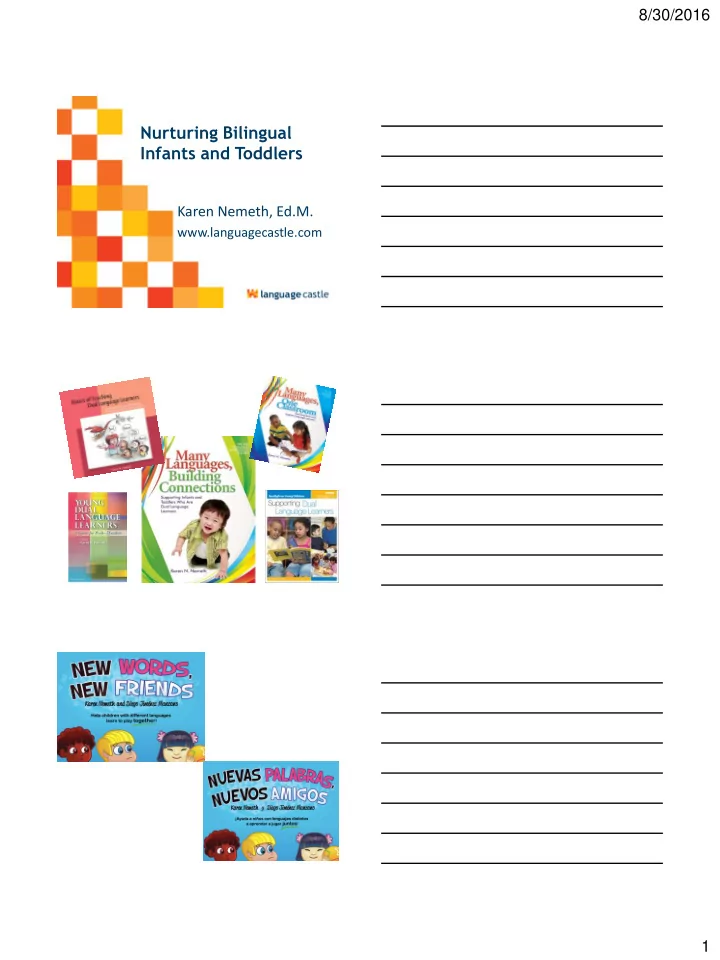

8/30/2016 Nurturing Bilingual Infants and Toddlers Karen Nemeth, Ed.M. www.languagecastle.com 1
8/30/2016 Language Castle www.languagecastle.com What do infants and toddlers need? POLL #1 What do infants and toddlers need? 1. Support of their home language & culture 2. While also learning English 3. Prepared and supported teachers/carers 4. A properly prepared environment 5. Partnership between program and family 2
8/30/2016 June 2, 2016 Federal Recommendations (pp. 20-29) • Use a strength based approach that embraces diversity. • Partner with families. • Identify and implement a plan for how languages will be used in the classroom to provide a rich language environment. Establish a culturally responsive learning environment. Ensure the workforce has competencies to support DLLs. Ensure that screenings and assessments are appropriate. Ensure the curriculum is appropriate. 3
8/30/2016 Promote positive teacher-child or provider-child relationships. Support monolingual staff in serving children who are DLLs. Accurately identify and serve children with disabilities who are DLLs. Facilitate smooth transitions within and across programs. What do infants and toddlers need? 1. Support of their home language & culture 2. While also learning English 3. - 4. - 5. - It is NOT our job to teach children English … It is our job to teach children! 4
8/30/2016 1st & 2nd language development begin before birth! Brain’s ability to catalog speech sounds from 2 languages is evident from birth Brain’s preparedness to learn in more than one language exists from birth The Linguistic Genius of Babies 5
8/30/2016 Language and Literacy DLLs have 2 separate language systems from early in life, but they are not negatively impacted from use of the 2 languages Cognitive Benefits Bilingual development can have important positive effects in metalinguistic awareness, cognitive flexibility, and enhanced executive functions. 6
8/30/2016 Research to Practice Features of high quality ece (intentional teaching, integrated learning, positive teacher-child and home-school relationships, low ratios, assessments, parent engagement) are important for DLLs, BUT NOT SUFFICIENT! strawberry 7
8/30/2016 “It’s not just about shoving words in” Kathy Hirsh-Pacek in NYT interview http://nyti.ms/2c5qUlB Key strategy: Always build connections Between familiar words and new words! 8
8/30/2016 How does language develop? Think about that very first spoken word X Young children are NOT sponges. … and to help them be the active language learners they need to be.... What do infants and toddlers need? 1. - 2. - 3. Prepared and supported teachers/carers 4. - 5. - 9
8/30/2016 How do we prepare teachers/carers for the populations they’ll serve? Pre-service training and coursework? Hiring bilingual staff? Job-embedded, in-service PD? Well-informed bosses supporting their work? Well-informed curriculum supports and professional development providers? What do infants and toddlers need? POLL #2 If you hire a person because they have additional language assets … you need to talk with them about how to USE those assets. Seriously. 10
8/30/2016 Prepare those teachers & paras! Talk about language use during interview Have written language plan/policy Provide orientation to bilingual staff Clearly define roles and responsibilities Prepare those teachers & paras! They need to know: When to use each language How to handle conversations with families How to build language through responsive conversations and explicit connections between words. How to build language through responsive conversations and explicit connections between words . Wait a minute … What was that??? Let’s talk about some examples. 11
8/30/2016 Conversations? With babies? Echo sounds Connect sounds with meaning – You’ll need families to help with this! Focus, eye-contact, joint attention, clear reference Songs with useable, meaningful words Baby sign language to bridge languages Explicit connections between words: Words don’t help if the child doesn’t know what you’re talking about …..... No matter how many millions of words you use. Seriously. Explicit connections between words: Pictures don’t help if they don’t mean anything to the child 12
8/30/2016 Explicit connections between words: Narrate what you’re doing IF the child is paying attention. Respond to child’s interest REGARDLESS of what you had planned Using words in home language is good IF you use them intentionally to build connections to meaning ... And to support first and second language development, these prepared teachers/carers need stuff to talk about... What do infants and toddlers need? 1. - 2. - 3. - 4. A properly prepared environment 5. - Features of culturally and linguistically responsive environment: Images, materials and displays that children can relate to Items from home Items with intrinsic meaning Items that are used and talked about Reduced visual and auditory clutter Easily changed in response to interests and needs 13
8/30/2016 Photos courtesy of King’s Daughters Day School and Bigstock.com 14
8/30/2016 Just remember these: What do infants and toddlers need? POLL #3 15
8/30/2016 Digital resources My Story app Wheels on the Bus By Duck Duck Moose Digital cameras, devices ...And, of course, technology gives us lots of ways to... 16
8/30/2016 What do infants and toddlers need? 1. - 2. - 3. - 4. - 5. Partnership between program and family What do infants and toddlers need? POLL #4 Reasons for supporting home language: Academic/Cognitive advantages Identity/Self-Esteem Family Strength Social Status & Relationships 17
8/30/2016 Considerations for families when you don’t understand : • Believe they want the best for their child – but they may not agree with you • Believe they are not having an easy life and you may not know the challenges they’ve faced • Believe that there is no one book on “cultural awareness” that’s going to help you relate to each individual family 18
8/30/2016 Culture is important for every child Insert video clip from movie Babies Karen Nemeth www.languagecastle.com Twitter: @KarenNemethEdM LinkedIn: ELLs/DLLs in Early Childhood Facebook: Karen Nemeth at Language Castle LLC Thank you! Karen@languagecastle.com www.languagecastle.com Twitter: @KarenNemethEdM LinkedIn: ELLs/DLLs in Early Childhood Facebook: Karen Nemeth at Language Castle LLC 19
Recommend
More recommend